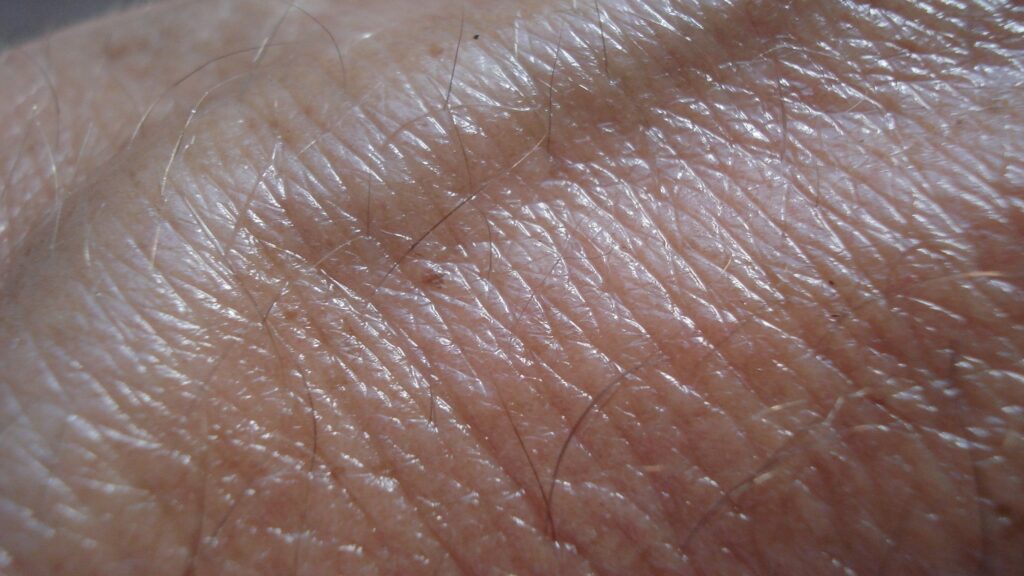
Science continues to peel away layers of the skin microbiome to reveal its protective properties. In a study published in Science Advances on February 28, University of California San Diego School of Medicine researchers report a potential new role for some bacteria on the skin: protecting against cancer.
“We have identified a strain of Staphylococcus epidermidis, common on healthy human skin, that exerts a selective ability to inhibit the growth of some cancers,” said Richard Gallo, MD, PhD, Distinguished Professor and chair of the Department of Dermatology at UC San Diego School of Medicine. “This unique strain of skin bacteria produces a chemical that kills several types of cancer cells but does not appear to be toxic to normal cells.”
The team discovered the S. epidermidis strain produces the chemical compound 6-N-hydroxyaminopurine (6-HAP). Mice with S. epidermidis on their skin that did not make 6-HAP had many skin tumors after being exposed to cancer-causing ultraviolet rays (UV), but mice with the S. epidermidis strain producing 6-HAP did not.
6-HAP is a molecule that impairs the creation of DNA, known as DNA synthesis, and prevents the spread of transformed tumor cells as well as the potential to suppress development of UV-induced skin tumors.
Mice that received intravenous injections of 6-HAP every 48 hours over a two-week period experienced no apparent toxic effects, but when transplanted with melanoma cells, their tumor size was suppressed by more than 50 percent compared to controls.
“There is increasing evidence that the skin microbiome is an important element of human health. In fact, we previously reported that some bacteria on our skin produce antimicrobial peptides that defend against pathogenic bacteria such as, Staph aureus,” said Gallo.
In the case of S. epidermidis, it appears to also be adding a layer of protection against some forms of cancer, said Gallo. Further studies are needed to understand how 6-HAP is produced, if it can be used for prevention of cancer or if loss of 6-HAP increases cancer risk, said Gallo.
More than 1 million cases of skin cancer are diagnosed in the United States each year. More than 95 percent of these are non-melanoma skin cancer, which is typically caused by overexposure to the sun’s UV rays. Melanoma is the most serious form of skin cancer that starts in the pigment-producing skin cells, called melanocytes.
“We have identified a strain of Staphylococcus epidermidis, common on healthy human skin, that exerts a selective ability to inhibit the growth of some cancers,” said Richard Gallo, MD, PhD, Distinguished Professor and chair of the Department of Dermatology at UC San Diego School of Medicine. “This unique strain of skin bacteria produces a chemical that kills several types of cancer cells but does not appear to be toxic to normal cells.”
The team discovered the S. epidermidis strain produces the chemical compound 6-N-hydroxyaminopurine (6-HAP). Mice with S. epidermidis on their skin that did not make 6-HAP had many skin tumors after being exposed to cancer-causing ultraviolet rays (UV), but mice with the S. epidermidis strain producing 6-HAP did not.
6-HAP is a molecule that impairs the creation of DNA, known as DNA synthesis, and prevents the spread of transformed tumor cells as well as the potential to suppress development of UV-induced skin tumors.
Mice that received intravenous injections of 6-HAP every 48 hours over a two-week period experienced no apparent toxic effects, but when transplanted with melanoma cells, their tumor size was suppressed by more than 50 percent compared to controls.
“There is increasing evidence that the skin microbiome is an important element of human health. In fact, we previously reported that some bacteria on our skin produce antimicrobial peptides that defend against pathogenic bacteria such as, Staph aureus,” said Gallo.
In the case of S. epidermidis, it appears to also be adding a layer of protection against some forms of cancer, said Gallo. Further studies are needed to understand how 6-HAP is produced, if it can be used for prevention of cancer or if loss of 6-HAP increases cancer risk, said Gallo.
More than 1 million cases of skin cancer are diagnosed in the United States each year. More than 95 percent of these are non-melanoma skin cancer, which is typically caused by overexposure to the sun’s UV rays. Melanoma is the most serious form of skin cancer that starts in the pigment-producing skin cells, called melanocytes.
 The Ultimate Detox Bath: Why Epsom Salt, Sea Salt, and Baking Soda Are a Game-Changer
The Ultimate Detox Bath: Why Epsom Salt, Sea Salt, and Baking Soda Are a Game-Changer Honey as an antibiotic: Scientists identify a secret ingredient in honey that kills bacteria
Honey as an antibiotic: Scientists identify a secret ingredient in honey that kills bacteria Manuka honey could help clear deadly drug-resistant lung infection
Manuka honey could help clear deadly drug-resistant lung infection Recurrent UTIs linked to gut microbiome, chronic inflammation
Recurrent UTIs linked to gut microbiome, chronic inflammation